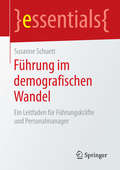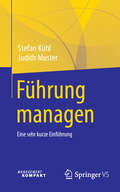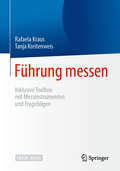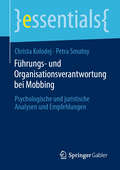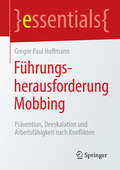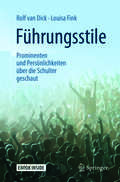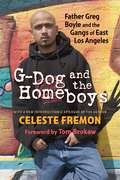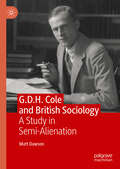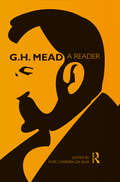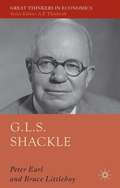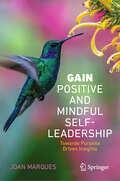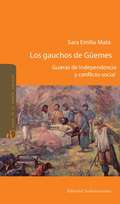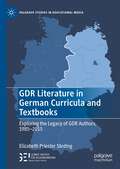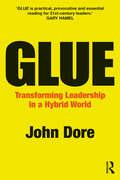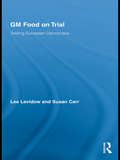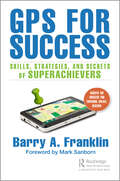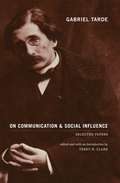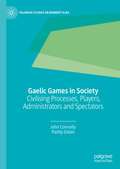- Table View
- List View
Führung im demografischen Wandel: Ein Leitfaden für Führungskräfte und Personalmanager (essentials)
by Susanne Schuett,,Wie Sie den Laden führen, wenn die Leute erst mit 75 in Rente gehen", so Peter Drucker einmal trefflich, ist die zentrale und zugleich schwierigste Management-Aufgabe der Zukunft. Dieses Essential unterstützt Führungskräfte und Personalmanager bei der Bewältigung dieser neuen Herausforderung - und zwar praxisnah und konkret. Es liefert eine kompakte Handlungsanleitung für ein effektives Führen im demografischen Wandel. Führungskräfte und Personalmanager haben jetzt die Chance, die schwierigste Lebenskunst im 21. Jahrhundert, unser neues Altern, im Sinne eines ,,Ready to Age" erfolgreich zu meistern, mitzugestalten und voranzutreiben.
Führung managen: Eine sehr kurze Einführung
by Stefan Kühl Judith MusterIn der Führungsdiskussion wird der Scheinwerfer bisher vorrangig auf Personen gerichtet. Es werden kleine interaktionelle Tipps und Tricks gegeben, mit denen man effektiver führen kann. Die Wirksamkeit dieser Vorgehensweisen sind jedoch begrenzt. In diesem Buch wird gezeigt, wie die Ausbildung von Führungsmöglichkeiten durch die Gestaltung von Organisationsstrukturen beeinflusst werden kann. Durch „gute Organisation“ können dabei Führungsnotwendigkeiten reduziert werden. Wer sinnvoll über Führung reden will, sollte deswegen über Organisation nicht schweigen.
Führung messen: Inklusive Toolbox mit Messinstrumenten und Fragebögen
by Rafaela Kraus Tanja KreitenweisDieses kompakte Fachbuch gibt Ihnen einen umfassenden Überblick über die wichtigsten Führungsansätze. Es enthält eine Toolbox mit mehr als 20 fundierten Messinstrumenten und Fragebögen, z.B. zu charismatischer, ethischer, narzisstischer oder psychopathischer Führung, die Sie auch für eigene Befragungen (z. B. Mitarbeiterbefragungen oder wissenschaftliche Studien) einsetzen können. Sie finden in diesem Werk Antworten auf Fragestellungen wie beispielsweise: Wie führt man Veränderungsprozesse zum Erfolg? Was macht authentische Führungskräfte so überzeugend? Ist es wirklich wahr, dass Frauen anders – oder sogar besser als Männer führen? Was macht toxische oder schlichtweg schlechte Führungskräfte so gefährlich? Lassen Sie sich anregen, Führungsverhalten in all seinen Facetten zu reflektieren, lernen Sie, wie man Führung messen kann und entwickeln Sie ganz nebenbei Ihre eigene Führungskompetenz weiter! Zielgruppen: Führungskräfte erhalten Inspiration und Orientierung für ihre eigene Führungspraxis, Studierende finden sich besser im breiten Feld der Führungsforschung zurecht und Praktiker aus dem Personalbereich können sich neueste Erkenntnisse der Führungsforschung aneignen. Zu den Autorinnen: Prof. Dr. Rafaela Kraus ist Professorin für Personalmanagement an der Universität der Bundeswehr München und Expertin für Leadership, Organisationsentwicklung und digitale Transformation. Tanja Kreitenweis ist wissenschaftliche Mitarbeiterin an der Universität der Bundeswehr München und forscht in den Bereichen Serious Gaming, Lernen, Change Management und Führung.
Führung und Personalentwicklung an Hochschulen: Sich selbst und andere entwickeln
by Dieter Frey Melanie VilserDer Hochschulalltag befindet sich im Wandel und stellt Führungskräfte und Mitarbeitende vor neue Herausforderungen. Dieses Buch vermittelt wertvolle psychologische Erkenntnisse, um diesen Herausforderungen zu begegnen. Dabei beantwortet es Fragen wie z.B.: Wie führt man? Wie schafft man Synergieeffekte in Teams? Wie wählt man gute Mitarbeitende aus? Wie führt man Mitarbeiter*innengespräche? Welche Feedbackkultur fördert Potenziale bestmöglich? Wie geht man mit Stress um? Basierend auf Trainings- und Beratungswissen für LMU Mitarbeitende erhalten Sie in diesem Buch langjährig erprobte alltagstaugliche Hinweise zum Aufbau wichtiger Kompetenzen wie Selbstführung, Mitarbeiter*innenführung, Personalauswahl und -entwicklung, Zeit- und Selbstmanagement, Stressmanagement und Achtsamkeit. Zielgruppen:Das Buch richtet sich an wissenschaftliche Mitarbeitende jeder Karrierestufe in Bildungseinrichtungen, an Professor*innen, Postdoktorand*innen wie auch Doktorand*innen. Im Mittelpunkt steht die kompakte Zusammenfassung des Kernwissens für eine gesunde und erfolgreiche Entwicklung der eigenen Potenziale sowie der Potenziale von Mitarbeiter*innen und Studierenden. Zu den Herausgeber*innen:Prof. Dr. Dieter Frey ist Leiter des LMU Center for Leadership and People Management und Mitglied der Bayrischen Akademie der Wissenschaften. Dr. Melanie Vilser ist wissenschaftliche Mitarbeiterin und Trainerin am LMU Center for Leadership and People Management.
Führungs- und Organisationsverantwortung bei Mobbing: Psychologische und juristische Analysen und Empfehlungen (essentials)
by Christa Kolodej Petra SmutnyChrista Kolodej und Petra Smutny zeigen Handlungsmöglichkeiten für Führungskräfte und Personalverantwortliche bei Mobbing in ihrem Einflussbereich auf. Mobbing wird als kontextbezogenes Phänomen vorgestellt, welches spezifische macht-, gruppen- und rollendynamische Prozesse aufweist. Es werden sowohl aus psychologischer als auch aus juristischer Sicht relevante Interventionen verdeutlicht. Das Buch wird mit praktischen Präventions- und Interventionstipps für Führungskräfte abgerundet, die aus Best-Practice-Beispielen von Führungskräften abgeleitet wurden.Die Autorinnen:Prof. Dr. Dr. Christa Kolodej, MA ist Pionierin der österreichischen Mobbingforschung und leitet seit 20 Jahren das Zentrum für Konflikt- und Mobbingberatung in Wien. Sie coacht Führungskräfte und Personalverantwortliche und unterstützt Unternehmen bei der Implementierung von Konfliktmanagementsystemen. Maga Petra Smutny, LL.M, ist Rechtsanwältin und eingetragene Mediatorin in Wien, Österreich, und beschäftigte sich als Richterin, Vorsitzende der Gleichbehandlungskommission und Autorin seit vielen Jahren mit den Themen Mobbing, Antidiskriminierung und Führungsverhalten.
Führungsherausforderung Mobbing: Prävention, Deeskalation und Arbeitsfähigkeit nach Konflikten (essentials)
by Gregor Paul HoffmannIn diesem Essential wird zunächst der Begriff Mobbing definiert und von anderen, ähnlich verwendeten abgegrenzt. Zudem skizziert der Autor die Entstehungsbedingungen von Mobbing-Geschehen und er formuliert unter Berücksichtigung der Konzepte der personalen und organisationalen Resilienz Schlussfolgerungen für die tägliche Führungsarbeit. Mobbing-Geschehen stellt immer eine Herausforderung für Führungskräfte dar. Im Zentrum der Aufmerksamkeit steht, wie Mobbing erkannt werden kann, wie Führungskräfte dazu beitragen können, die Arbeitsfähigkeit der Gruppe wiederherzustellen, und nicht zuletzt wie bereits präventiv gegen Mobbing gewirkt werden kann.
Führungskraft - und was jetzt?: Vom Kollegen zum Vorgesetzten: Den Rollentausch meistern, Lösungen aus Psychologie und Praxis
by Diana KoppDer Rollenwechsel vom Mitarbeiter zum Vorgesetzten ist eine der größten Veränderungen, die eine Berufskarriere bereit halten kann. Nicht wegen neuer fachlicher Anforderungen, sondern wegen zahlreicher, meist unvorhersehbarer Herausforderungen im psychologischen, kommunikativen Bereich! – Fühlen Sie sich auf diesen Rollenwechsel vorbereitet? Antworten Sie nicht zu schnell – schauen Sie lieber zunächst kurz in dieses Buch hinein! Denn es berücksichtigt verschiedene Persönlichkeiten und bietet Hilfestellungen, egal ob Sie eher vorsichtig oder forsch an die neue Aufgabe herangehen wollen.Das Buch ist in vier übersichtliche Hauptkapitel unterteilt: Selbstführung, Mitarbeiterführung, Umgang mit Vorgesetzten, Privatleben. – Denn dies sind die Bereiche, in denen frisch gebackene Führungskräfte Veränderungen erleben und auf unerwartete Stolperfallen treffen können. – Von der selbstbewussten Jung-Vorgesetzten, die ihre Mitarbeiter mit neuen Ideen überfordert, über den vorsichtigen Chef, der an seinen eigenen hohen Erwartungen verzweifelt bis hin zur hochveranlagten Oberärztin, die aufgrund langer Arbeitszeiten in den Konflikt mit der Familie gerät – sie alle finden Rat und praktische Tipps für den neuen Alltag. – Ganz praxisnah aufbereitet mit Fallbeispielen, Checklisten und Arbeitsblättern.
Führungsleben: Inside Leadership - Top-Manager im persönlichen Interview
by Uwe Böning Brigitte Fritschle Stefan Oefner-PyDieses Buch macht die psychologische Wirklichkeit des Führungsalltags in Unternehmen ungeschminkt sichtbar, indem es Top-Manager und Führungskräfte unterschiedlicher Bereiche sehr persönlich – manchmal anonym – zu Wort kommen lässt: Managerinnen und Manager aus den Branchen Energie, Industrie, Banking, Politik, Beratung, Architektur, Universität und Schule, Küche, Kunst und Kirche berichten in ausführlichen Interviews sehr authentisch, manchmal etwas „ungeschliffen“, aber immer sehr ehrlich aus ihrem „Führungsleben“, von den ersten Erlebnissen mit dem Phänomen Führung über schwierige (Grenz-)Erfahrungen und Misserfolge bis hin zu Erfolgserlebnissen und ihren ganz persönlichen Lernerfahrungen. Herausgekommen ist ein Kaleidoskop an realen Führungsgegebenheiten, die den Leserinnen und Lesern realistische Impulse geben und mit denen sich alle, die sich mit Führung befassen, auseinandersetzen müssen, ob gewollt oder nicht. Ein Buch für alle, die geduldig etwas tiefer hinter die Kulissen der Führungsetagen blicken möchten – jenseits der üblichen Werbebotschaften, Führungsratgeber und Erfolgsrezepte.
Führungsstark in Kindertageseinrichtungen: Wertschätzung als neues Erfolgsprinzip für Kita-Leitungen (essentials)
by Susanne Schuett Julia HitzenbergerDieses essential unterstützt Kita-Leitungen bei der Bewältigung der Belastungen am Arbeitsplatz Kita, die heute eine besondere Führungsstärke brauchen, um ihre Mitarbeiter/-innen, betreuten Kinder und Eltern durch die Wertschätzungskrise zu führen. Nach dem neuen Erfolgsprinzip „Mit Wertschätzung zu Wertschöpfung“ zeigen wir fünf konkrete Schritte, wie Kita-Leitungen ihre Mitarbeiter/-innen binden, qualifizieren, gesund erhalten, motivieren und zufriedenstellen – für eine Verbesserung des „Lebens und Arbeitens“ und der frühpädagogischen Qualität in Krippe, Kindergarten und Hort.
Führungsstile: Prominenten und Persönlichkeiten über die Schulter geschaut
by Rolf Van Dick Louisa FinkIn einer Zeit, die von Wandel und Veränderung geprägt ist, ist gute Führung entscheidend für den Erfolg – von Unternehmen, aber auch in der Politik oder im Sport. Aber wie sieht gute Führung aus?Der Leser bekommt mit diesem Buch exklusive Einblicke in die Praxis der Führung – nicht nur in Unternehmen, sondern in viele gesellschaftliche Bereiche: Von Kirche und Kunst über Journalismus und Militär bis zur Politik. Rolf van Dick hat mit herausragenden Menschen gesprochen, die in ihren Bereichen zu anerkannten Führungspersönlichkeiten zählen. Dazu gehören der Dalai Lama, Sara Wagenknecht, Birgit Prinz, Wolfgang Niedecken oder Günter Grass oder der ehemalige Bundespräsident Roman Herzog. Im Gespräch ist er diesen Persönlichkeiten – oft in ihrem Zuhause – nahe gekommen und hat faszinierende Geschichten gehört. Dieses Buch bietet eine inspirierende Auswahl der spannendsten Gespräche, in denen immer der Frage nach den ganz persönlichen Führungsstilen der Interviewpartner nachgegangen wird. Von der provokanten Frage angefangen, ob Führung überhaupt notwendig ist, diskutiert Rolf van Dick mit seinen Gesprächspartnern, warum Führung häufig schief geht, worauf es im 21. Jahrhundert ankommt und welche Werte für den Erfolg Aktualität haben. Auch die Frage, ob man Führung lernen kann oder dafür „geboren“ sein muss, wird sehr vielfältig beantwortet.Das Werk liefert Einsichten und bietet Anregungen sowohl für erfahrene Manager, als auch an Führung interessierten Einsteigern die eine Inspiration für ihren (Führungs-)Alltag suchen.
Für die Praxis gerüstet!?: Practice Readiness am Ende des Fachhochschulstudiums Gesundheits- und Krankenpflege in Österreich
by Ursula Halbmayr-KubicsekBei dem vorliegenden Band handelt es sich um eine qualitative Evaluationsstudie des Studienganges Gesundheits- und Krankenpflege an österreichischen Fachhochschulen.Der Pflegeberuf hat sich in den letzten Jahrzehnten weiterentwickelt und an Komplexität zugenommen. Um diesen Anforderungen gerecht zu werden, benötigen Pflegende unterschiedliche Kompetenzen und Fertigkeiten. Im Rahmen der generalistischen Pflegeausbildung an den Fachhochschulen sollen die Studierenden innerhalb von sechs Semestern diese gesetzlich geforderten Kompetenzen erlernen, um eine Practice Readiness zu entwickeln. Ziel dieses Forschungsprojektes war die qualitative Evaluierung hinsichtlich der Practice Readiness der Absolventinnen und Absolventen. Es fanden qualitative Befragungen von Studierenden der Pflege, Führungspersonen im basalen und mittleren Pflegemanagement sowie Berufseinsteigerinnen und -einsteiger statt. Aus diesen unterschiedlichen Perspektiven konnte die Practice Readiness der Fachhochschulabsolventinnen und -absolventen dargestellt werden.
G-Dog and the Homeboys: Father Greg Boyle and the Gangs of East Los Angeles
by Celeste FremonFather Gregory J. Boyle, SJ, is a native of Los Angeles, a Jesuit priest, and founder of Homeboy Industries, an economic development and jobs program begun in 1988 for at-risk and gang-involved youth. "A great many kids in my neighborhood don't plan their futures; they plan their funerals." G-Dog and the Homeboys presents the story of Boyle's unconventional ministry and its extraordinary successes. In this expanded, updated edition, Celeste Fremon has returned to East L.A. to report on gang members she first profiled fifteen years ago. Using their individual stories as models, she examines what policy makers should know about gang intervention now, years later.
G.D.H. Cole and British Sociology: A Study in Semi-Alienation
by Matt DawsonThis book explores G.D.H Cole’s significant yet often overlooked role in the history of British Sociology from 1920-1960. Eager to achieve a sense of scientific legitimacy following its institutionalisation in the early 1900s, British sociology had no space for a scholar like Cole, who saw sociology as an innately normative and political project which, in his case, was dedicated to the development of socialism. Conceptualising Cole's relationship to sociology as one of semi-alienation - suggesting an openness to the principles of the discipline yet disagreement with the form it takes in the current day - Dawson shows how Cole made a number of important sociological contributions which were grounded in an early form of structuration theory, including the production of one of Britain’s first sociology textbooks and an early monograph on the sociology of class. A passionate advocate for what sociology could be, Cole was a promoter of the sociological Marx and interrogator of Durkheim as part of his desire to develop sociology in Britain, including at his own institute of the University of Oxford. Cole also produced a distinctive corpus of public and creative sociology expressed in newspaper articles, poems and songs. Drawing on archival research Dawson reintegrates Cole into the history of British Sociology, and in so doing offers valuable insight into sociology's history and its contemporary form, emphasising a normative, critical and public form of the discipline.
G.H. Mead: A Reader (Routledge Classics in Sociology)
by G. H. MeadThis book introduces social scientists to the ideas of George Herbert Mead (1863-1931) - one of the most original yet neglected thinkers of early twentieth century sociology. Mead is an exceptional case amongst sociological classics in that, until now, there has been no comprehensive reader of his work. As the first one-volume, comprehensive edited collection of Mead’s published and unpublished writing, this book fills this gap. It is the first to critically assess all of Mead's writings and draw out the aspects that are central to his system of thought. The book is divided into three parts (social psychology, science and epistemology, and democratic politics), comprising a total of 30 chapters - a third of which are published here for the first time. G.H. Mead: A Reader provides a unique and timely contribution to the understanding of this key theorist. It is essential reading for both undergraduate and postgraduate students in the fields of sociology, social psychology, philosophy of social science, social and cultural anthropology, and social and political theory.
G.I. Messiahs
by Jonathan H. EbelJonathan Ebel has long been interested in how religion helps individuals and communities render meaningful the traumatic experiences of violence and war. In this new work, he examines cases from the Great War to the present day and argues that our notions of what it means to be an American soldier are not just strongly religious, but strongly Christian. Drawing on a vast array of sources, he further reveals the effects of soldier veneration on the men and women so often cast as heroes. Imagined as the embodiments of American ideals, described as redeemers of the nation, adored as the ones willing to suffer and die that we, the nation, may live-soldiers have often lived in subtle but significant tension with civil religious expectations of them. With chapters on prominent soldiers past and present, Ebel recovers and re-narrates the stories of the common American men and women that live and die at both the center and edges of public consciousness. "
G.l.s. Shackle
by Michael Jefferson Peter E. Earl Bruce LittleboyThis is an intellectual biography of G. L. S. Shackle, economic theorist, philosopher, and historian of economic theory. It explores how Shackle challenged the aims, methods and assumptions of mainstream economics. He stressed macroeconomic instability, and developed a radically subjectivist theory for behavioural economics and business planning.
GAIN Positive and Mindful Self-Leadership: Toward Purpose Driven Insights
by Joan MarquesThis book proposes a new model, GAIN (Generating, Appreciating, Internalizing, and Newness) that shifts negative thinking patterns many find themselves in today’s society. Whether from extremely short-termed, thus unrealistic, expectations or general victim thinking, many people, particularly professionals, consider past experiences that don’t lead to immediate and tangible benefits as a waste of time. They forego long-span self-reflection to acknowledge their progress in life. This book uses mindful practices to shift these negative thought patterns into constructive ones that reveal personal purpose and growth, and thus, positive self-leadership and development. Featuring practices and exercises to support the GAIN model, this book will help readers see every life experience as a gain rather than loss, even if it may take some time to see the benefits from it, if at all.
GAUCHOS DE G EMES, LOS (EBOOK)
by Sara Emilia MataCómo fueron recibidas en Salta las novedades producidas en Buenos Aires en mayo de 1810? Por qué tuvo lugar en la provincia de Salta una prolongada guerra contra los realistas? Cuáles fueron las razones que llevaron a gran parte del campesinado salteño a tomar las armas? y Porqué lo hicieron siguiendo a Martín Miguel de G emes? Estas y otras preguntas se contestan en este libro, analizando los complejos problemas que atravesaron a la sociedad salteña en las primeras y cruciales décadas del siglo XIX. Para ello se estudian las características que presentaba la sociedad de Salta a fines de la colonia y sus reacciones frente a los inicios del proceso revolucionario; la contrarrevolución alentada por las familias realistas y por la proximidad del ejército del Rey enviado desde Lima; se analiza la insurrección rural que sostuvo la causa de la #libertad americana#; y la construcción de los liderazgos emergentes en la resistencia a la ocupación realista y en particular el de Martín Miguel de G emes, Jefe de la Vanguardia del Ejército Auxiliar del Perú y Gobernador de la Provincia de Salta a partir de 1815.
GDR Literature in German Curricula and Textbooks: Exploring the Legacy of GDR Authors, 1985-2015 (Palgrave Studies in Educational Media)
by Elizabeth Priester StedingThis book analyzes the changing portrayal of GDR literature in German Gymnasium textbooks 1985-2015. Addressing the need for textbook research to broaden its focus from GDR history to GDR literature, the author presents case studies of well-known GDR authors (Bertolt Brecht, Johannes R. Becher, Anna Seghers, Wolf Biermann, and Christa Wolf), each examining a particular aspect of the societal discourse about GDR literature and the tension between (literary) text and (historical) context. Taken together, the case studies reveal the frequently underestimated power of ideology in literature textbooks. They also show how attempts to package these authors into simplified categories ultimately reveal the profound complexities of the GDR literary legacy. By examining the clear tension between literature and politics in textbooks and curricula, the author demonstrates how ideological messages are transmitted in all textbooks, as well as the importance of attending to overt and covert ideology.
GLUE: Transforming Leadership in a Hybrid World
by John DoreThe adoption of remote, hybrid and flexible working is the new normal. But like the old normal, no one seems very happy. The solution requires a different type of leadership – one that unites, transforms and elevates performance. Leadership that creates glue. With employee engagement, productivity and personal ties on the wane, leaders urgently need to refocus on harnessing relationships, making their organisations more humane, and finding new ways to engage and unleash talent. To do that, the single, most impactful thing leaders can do is to create and nurture an intangible, yet essential, factor called glue. So, this book sets out some ideas about glue: where to look for it, how to use it and, most importantly, how to cultivate glue amongst your most valuable people. It explores the approach of some unusual leaders, and of firms transformed through the ‘organisational advantage’ of smartly configuring and harnessing talent. Using stories from firms such as Alibaba, Apple, Barclays, Sky, Husqvarna Group, HSBC, Space X, Zopa and Richer Sounds, the book shows how leaders can shape the effectiveness of teams, reimagine the workplace, and reinvigorate their business through the talents, ideas and energy of their firm’s best people. This book is for anyone who has a genuine interest in leading others with impact and wants to better unite, transform and elevate their business. Whatever your role, sector or seniority, this book sets out a distinctive vision for the firm and shows the profound impact you can make through creating and nurturing glue.
GM Food on Trial: Testing European Democracy (Genetics and Society)
by Susan Carr Les LevidowEurope was told that it had no choice but to accept agbiotech, yet this imperative was turned into a test of democratic accountability for societal choices. Since the late 1990s, European public controversy has kept the agri-biotech industry and its promoters on the defensive. As some opponents and regulators alike have declared, ‘GM food/crops are on trial’. Suspicion of their guilt has been evoked by moral symbols, as disputes over whether genetically-modified products are modest benign improvements on traditional plant breeding, or dangerous Frankenfoods; and in disputes over whether they are global saviours, or control agents of multinational companies. This book examines European institutions being ‘put on trial’ for how their regulatory procedures evaluate and regulate GM products, in ways which opened up alternative futures. Levidow and Carr highlight how public controversy created a legitimacy crisis, leading to national policy changes and demands, in turn stimulating changes in EU agbiotech regulations as a strategy to regain legitimacy.
GPS for Success: Skills, Strategies, and Secrets of Superachievers
by Barry A. FranklinNext to food and clothing, achieving personal and professional success is rated at the very top of the hierarchical order of human needs. Everybody wants to be somebody! In this ultimate success book that includes timeless information for generations to come, the author has meticulously chronicled proven skills, strategies and secrets that, if regularly followed, will empower the reader to live the life that they imagine. Just like your car’s or phone’s GPS, these life navigation skills can get you from where you are to where you want to go in your career. In addition, critically important knowledge and abilities, including job interviewing, must-know people skills, writing, and public speaking, are covered. In this book, the author has scoured the world’s literature on these topics and interviewed highly successful people to provide one-stop shopping regarding the most proven and practical recommendations for future career success. He has also peppered the text with personal experiences and motivational/inspirational success stories, as well as testimonials/sage advice/quotes from the world’s most successful people --past and present. The key objectives of this book are to: • Highlight the foundational factors underlying future career success: love what you do; realize that your behaviors largely determine your luck in life; emphasize that highly successful people take 100% responsibility for their actions and destiny; and that the secret to success involves the selfless serving of others. The rewards return—through a boomerang effect. • Provide specific examples and inspirational stories highlighting 10 critical behavioral skills for success. These include: look for the good in people and situations; how to activate the law of attraction; establish goals in writing ("if it’s not on paper, it’s vapor"); take action (#1 success characteristic); know that persistence pays; ask for things you want; enhance your speaking, writing, and interviewing skills; why it’s important to work with and learn from people you want to emulate; the essence of superb people skills (e.g., integrity, making others feel important); and to regularly apply the law of sow and reap. • Detail complementary approaches, tactics, and perspectives that can help you achieve your breakthrough (major) life goals. These include: time management skills and the 80/20 rule; looking for greener pastures; showcasing your talents (visibility → opportunities); committing to never-ending improvements in performance, service (or products); embracing discipline/focus/sacrifice; routinely exceeding people’s expectations; striving for greater rewards; and seeing an ocean of opportunities before you. In aggregate, these yield BIG rewards in life. • Provide a potpourri of related topics, including unlooked-for opportunities; leadership and bringing out the best in those around you; avoiding overcautiousness; volunteering (raising your hand); reframing future commitments; the power (and magic) of an unexpected thank you note; and the disproportionate dividends and good karma that result from giving back and mentoring others.
Gabriel Tarde On Communication and Social Influence: Selected Papers (Heritage of Sociology Series)
by Gabriel Tarde Terry N. Clark Morris JanowitzGabriel Tarde ranks as one of the most outstanding sociologists of nineteenth-century France, though not as well known by English readers as his peers Comte and Durkheim. This book makes available Tarde’s most important work and demonstrates his continuing relevance to a new generation of students and thinkers. Tarde’s landmark research and empirical analysis drew upon collective behavior, mass communications, and civic opinion as elements to be explained within the context of broader social patterns. Unlike the mass society theorists that followed in his wake, Tarde integrated his discussions of societal change at the macrosocietal and individual levels, anticipating later twentieth-century thinkers who fused the studies of mass communications and public opinion research. Terry N. Clark’s introduction, considered the premier guide to Tarde’s opus, accompanies this important work, reprinted here for the first time in forty years.
Gabriel Tarde: The Future of the Artificial (Routledge Studies in Social and Political Thought)
by David ToewsThis book presents the core ideas of early sociologist Gabriel Tarde and suggests a new pathway for sociology based on his foundational work. Rejecting anthropocentrism, Tarde highlights the contrast between the natural and the artificial, uniquely emphasizing the positive significance of the artificial in an age in which people have come to distrust it profoundly. Recovering Tarde’s theory today in the context of contemporary as well as classical scholarship and recognizing how it fits with such phenomena as quantum physics and digital media, this book develops the concept of the cosmological imagination as the context for a critical Tardian analysis of artifice that can bring together what we know about our contemporary future-oriented global societies. How we know the universe, our place in it, the place of other animals and objects in it, our global socialities, our human claims of power and privilege within it, are pointed questions Tarde asks as he wonders whether a future temporality conducive to constant artifice has become our normal human way of life. Considering our ambivalence about modern products and modernity in general, our thinking about the future, and our tendency to forget what nature used to signify in its presentation of problems beyond our control, such as illnesses and epidemics, Gabriel Tarde: The Future of the Artificial demonstrates the reasons for which we need to return to Tarde’s work to rediscover its relevance for public debate as we seek to think through the new era and its societies in which culture and nature are no longer distinct. This book will appeal to scholars of social and political theory with interests in our digital age, new sociologies of materials and objects, neomonadology, and the thought of Gabriel Tarde.
Gaelic Games in Society: Civilising Processes, Players, Administrators and Spectators (Palgrave Studies on Norbert Elias)
by John Connolly Paddy DolanIn this book John Connolly and Paddy Dolan illustrate and explain developments in Gaelic games, the Gaelic Athletic Association (GAA), and Irish society over the course of the last 150 years. The main themes in the book include: advances in the threshold of repugnance towards violence in the playing of Gaelic games, changes in the structure of spectator violence, diminishing displays of superiority towards the competing sports of soccer and rugby, the tension between decentralising and centralising processes, the movement in the balance between amateurism and professionalism, changes in the power balance between ‘elite’ players and administrators, and the difficulties in developing a new hybrid sport. The authors also explain how these developments were connected to various social processes including changes in the structure of Irish society and in the social habitus of people in Ireland.
